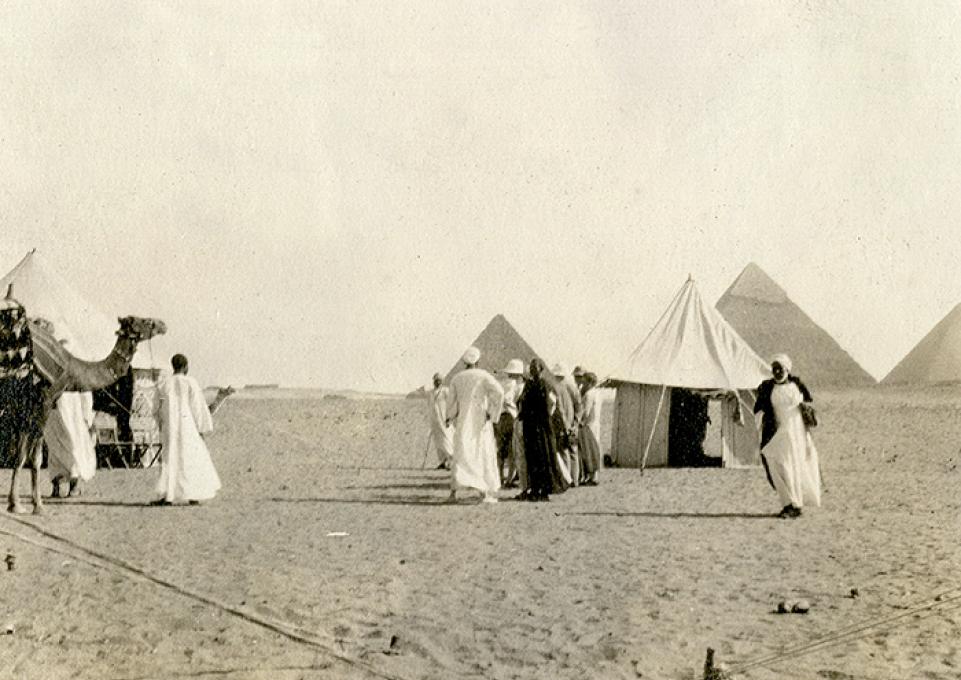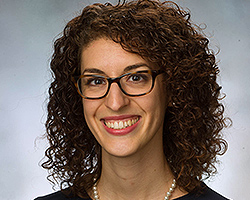
Harry Rockwell’s faded sepia photographs of his Middle East travels in the 1920s evoke an era distant from today in more ways than time. Rockwell, Buffalo State’s first president, gave his personal photograph collection, travel photographs and papers, and writings to E. H. Butler Library. The collection is now online, thanks to Archives and Special Collections at Buffalo State.
 Recently, two collections have been added to those already managed by Archives and Special Collections. Bound hard copies of the Buffalo alternative weekly Artvoice, first published in 1990, and a collection of Buffalo musician Jackie Jocko’s material have been added to a list of collections that include scripts from the 1990s sitcom Murphy Brown and, on microfilm, every edition of Buffalo’s defunct newspaper, the Courier Express, from its first issue in 1926 to its last in 1982.
Recently, two collections have been added to those already managed by Archives and Special Collections. Bound hard copies of the Buffalo alternative weekly Artvoice, first published in 1990, and a collection of Buffalo musician Jackie Jocko’s material have been added to a list of collections that include scripts from the 1990s sitcom Murphy Brown and, on microfilm, every edition of Buffalo’s defunct newspaper, the Courier Express, from its first issue in 1926 to its last in 1982.
Rockwell’s collection belongs to Buffalo State’s archives; Artvoice and Jackie Jocko’s material belong to Buffalo State’s special collections. Dan DiLandro, college archivist and special collections librarian, said, “We have a dual charge: handling unique material that Buffalo State must often maintain for fiduciary, historical, and legal purposes, and maintaining material that has unique historical value.”
Archives Tell the Buffalo State Story
What was on students’ minds in 1913? You can find out by browsing through the first issue of The Record, the student newspaper that printed its last issue in 2016. (It’s still published online.)
Or consider the admissions requirements for prospective teachers in 1871: “…at least sixteen years of age, and must possess good health, good moral character, and average abilities. …” That information can be found in the prospectus issued when Buffalo State first opened its doors as a teacher training school.
Scrapbooks created by former students are also in the Archives, along with “anything that may have been produced by Buffalo State in the daily course of business," according to DiLandro. However, not everything can be saved. “Decided what has ‘unique historical value’ is a judgment call that involves considering what may be relevant to our curriculum,” said DiLandro.
Special Collections Add Resources for Faculty, Students, and Community Hope Dunbar, special collections archivist, said that archivists are charged with maintaining historical papers and records for organizations, which include multinational corporations and small non-profit institutions. “An archivist’s duty,” she said, “is to process, arrange, describe, and make available such papers. We are stewards of cultural history and material.”
Hope Dunbar, special collections archivist, said that archivists are charged with maintaining historical papers and records for organizations, which include multinational corporations and small non-profit institutions. “An archivist’s duty,” she said, “is to process, arrange, describe, and make available such papers. We are stewards of cultural history and material.”
That commitment means that the decision to accept a collection is complex and difficult. “It takes a lot of appraisal,” said Dunbar. “How big is the collection? How many boxes? Is it organized? What condition is it in? How much staff time will it take to process it?”
Many of the collections reflect some tie to Buffalo State. Some were donated by alumni such as Tom Fontana, whose career as an Emmy-winning television writer and producer made history with Oz, HBO’s first drama.
Others reflect Buffalo State’s ties to Buffalo, including the T-shirts that are now part of the online Wearing Gay History collection. The first T-shirts in the collection were part of the Dr. Madeline Davis LGBTQ Archives of Western New York. The Fronczak Room Collections is a repository of materials related to Western New York’s Polish-American community. The Monroe Fordham Regional History Center’s collection includes papers and oral histories from African American organizations as well as records from area churches, unions, and cemeteries.
Like most archivists, DiLandro and Dunbar don’t have the resources to store, organize, and conserve their material as thoroughly as best practices might suggest. “More product, less process” is their motto. “Right now, the best we can do,” said Dunbar, “is to organize material to the point where researchers have a starting point for finding information.”
